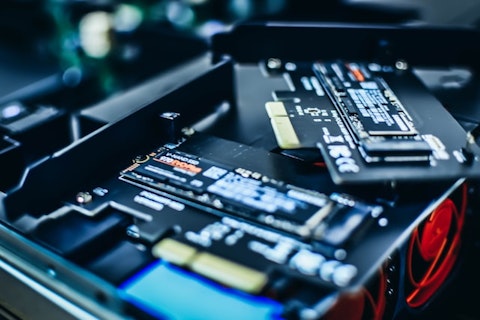Netlist, Inc. (PNK:NLST) Q4 2022 Earnings Call Transcript February 21, 2023
Operator: Good day. And welcome to Netlist’s Fourth Quarter 2022 Earnings Conference Call. All participants will be in listen-only mode. . Please note that this event is being recorded. I’d now like to turn the conference over to Mike Smargiassi of Investor Relations. Please go ahead.
Mike Smargiassi: Thank you, Jon, and good day, everyone. Welcome to Netlist’s fourth quarter 2022 conference call. Leading today’s call will be Chuck Hong, Chief Executive Officer of Netlist and Gail Sasaki, Chief Financial Officer. As a reminder, the earnings release and a replay of today’s call can be accessed on the investor section of the Netlist website at netlist.com. Before we start the call, I would note that today’s presentation of Netlist results, and the answers to questions may include forward-looking statements, which are based on current expectations. The actual results could differ materially from those projected in the forward-looking statements, because of the number of risks and uncertainties that are expressed in the call, annual and current SEC filings, and the cautionary statements contained in the press release today. Netlist assumes no obligation to update forward-looking statements. I would now like to turn the call over to Chuck.
Chuck Hong: Thanks Mike. And hello, everyone. Netlist delivered strong top line performance in 2022, full year product revenue increased 58% and product gross profit improved 34% compared to the prior year. These results reflect the favorable price and demand environment in the first half of 2022. However, the second half of the year saw post pandemic decline in demand combined with enormous inventory build up to create historical downturn in the memory industry in terms of its scope and severity. Analysts anticipate a gradual improvement in the market environment towards the end of 2023 as levels of inventory, memory inventory starts to normalize. That said, we expect demand to remain sluggish throughout most of the year and the industry dynamics to continue to impact the company’s performance on the product side of the business.
Beyond the macro trends, there are important technological developments, such as the rollout of DDR5 and the growth of HBM that bode well for the long term health of the industry. DDR5 brings improved performance in terms of speed with double the bandwidth of DDR4, along with enhanced power management capabilities that reduce power consumption. The need for higher capacity memory has also led to a wide adoption of high bandwidth memory, or HBM, which is a stack of four or eight DRAM dies tied together with a logic layer that controls the DRAM dies. Across the board, the industry is moving towards localizing intelligence onto the packaged components and the memory modules. As the speeds and densities increase, it’s becoming more difficult to manage increasingly complex memory subsystems from afar the processor.
Fundamental shift to assist self-managing memory is what Netlist has pioneered a decade ahead of the industry. Our efforts have resulted in breakthrough innovations in the areas of load reduction, HBM and DDR5 on DIMM power management from which the computing industry benefits today and will continue to benefit in the future. The campaign to enforce our IP rights are tied to these and other fundamental technologies which Netlist created years ago and is being now widely implemented by both large and small memory manufacturers. Netlist continues to innovate in localizing memory intelligence as well as in important emerging areas such as CXL. Netlist made significant progress in 2022 with its Global IP Enforcement campaign. Our continuing goal is to ensure our innovations are secured by high quality patents and that those patents are being fairly licensed by marketplace implementers.

Photo by Marc PEZIN on Unsplash
We continue to leverage the experience of both our in house council and outside firms, including and Manila. In the Netlist’s action against Samsung in the Eastern District of Texas, there were a number of favorable developments in 2022 and now in 2023, we approach the culmination of this case in the form of a jury trial. As a reminder, this case addresses Samsung’s infringement of six Netlist patents covering LRDM, DDR5, and high bandwidth memory, or HBM. In December, the court issued a claim construction order, largely adopting Netlist’s position for many of the claim terms at issue, creating the basis for establishing Samsung’s infringement. More recently, Judge Gilstrap rejected Samsung’s second motion to stay the case and allowed Netlist’s request for additional deposition, testimony and fact discovery.
This case has now proceeded into the conclusion of the expert discovery phase with a final pretrial conference set to start for March 27. The jury trial was moved up two weeks to accommodate the court’s schedule and is set to begin April 17. We expect the jury trial to last approximately one week. Judge Gilstrap is also presiding over Netlist’s case against Micron for infringement of the same six patents. Claim construction is scheduled for that case for July 2023. The jury trial is scheduled for January 2024. There’s a second set of cases against Samsung and Micron in the Eastern District of Texas. Judge Gilstrap consolidated these cases because each involves a 912 patent. The 912 patent and related child patents, claim constructions for that consolidated case is set for October, and a trial date for both is set for April 15, 2024.
I would note that Netlist’s case against Google in the Northern District of California remains stayed pending the outcome of the second Eastern District Texas case against Samsung. October is shaping up to be a busy month because on October 20th, Netlist will also have a claim construction hearing and the declaratory action that Samsung brought against us in Delaware. The jury trial for this case has been scheduled for 2025 and now includes Google as a party to the proceedings after the entry of our amended counter claims. The Netlist case against Micron in the Western District of Texas remains stayed pending the resolution of the four remaining IPRs Micron filed against Netlist patents, but will eventually proceed to a jury trial given the PTAB’s denial of institution on Micron’s IPR petition against the 608 patent.
The cases in Germany against Google, Samsung and Micron are also moving ahead as expected. Final one day oral hearings are set for upcoming May 3 for Micron, September 5 for Samsung and October 9 for Google, all in Dusseldorf. We expect court decisions to come six to eight weeks after each individual hearing. In addition to monetary damages, Netlist is also seeking injunctive relief in the German cases. I would also like to update you on the 912 Patent IPR proceedings following the Patent Trial and Appeals Board’s decision to institute IPR trial against claim 16 of our 912 patent, Netlist submitted a request for rehearing of the matter along with a request for the review by the USPTO’s presidential Opinion Panel. As you know, the 912 patent has been validated many times over the past 13 years and various reexaminations related proceedings, including after two appeals to the PTAB and ultimately following a final decision at the Federal Circuit Court of Appeals.
We view Samsung’s latest attempt to invalidate an important 912 claim on Google’s behalf as an abuse of the IPR process. In the past several months, I’ve written a couple of articles in the industry publications about our thoughts on the detrimental effects of IPR abuses on the patent system and the broader innovation economy. These are available on the company’s website. We’ve also visited with Congress in recent months in order to provide our input as they consider much needed legislative reforms on the current patent law. On January 5, 2023, USPTO Director, Kathi Vidal exercised her authority sua sponte and brought Samsung’s 912 IPR proceedings under her review. Director Vidal cited the importance of the case to both the USPTO and the patent community, and deciding to take this under her personal review.
She stayed the 912 IPR pending the outcome of her review, and on February 3, she entered a decision requiring the assigned PTAB board to reevaluate Netlist’s request for discovery on the admitted relationship between Samsung and Google. She also ordered that if the Board determines Google is a real party of interest under Samsung’s petition, the Board must vacate its institution decision and deny Samsung’s petition. We’re pleased that the Director Vidal elevated this request to her review and hope that the board will take a closer look at all the facts underpinning Samsung and Google’s relationship. In summary, we’ve invested extensively over the years in the IP enforcement process and look forward to seeing the fruits of our labor and the validation of our intellectual property in the coming months.
I will now turn the call over to Gail for the financial review.
Gail Sasaki: Thanks Chuck. During the twelve months ended December 31, 2022, total product revenues grew to $161.6 million from $102.4 million, an increase of close to 60%. ’22 product gross profit dollars of $11.9 million equated to an increase of 34% over the same comparative period. Net product sales for the fourth quarter of 2022 were $21.7 million, and product gross profit dollars were $1.6 million. Fourth quarter results reflect the continued industry downturn in demand for memory and oversupply in the market, and a soft pricing environment with product revenue declining on a year-over-year as well as sequential and quarterly basis. As a reminder, we do not formally guide, but given the continued lack of visibility and market dynamics as noted by industry analysts and Chuck earlier, we currently expect sluggish demand throughout 2023 and that Q1, €˜23 product revenue to be significantly less than Q4, €˜22.
The full year increase in operating expense compared to the prior period was mainly due to increased global investment in the sales, marketing and engineering teams necessary to support long term sales and R&D acceleration. Legal expenses also increased from the year ago period as well as quarter-over-quarter due to pretrial activity. Given the number of active campaigns and upcoming trials, we expect legal costs to remain elevated in 2023, specifically in the first quarter. We continue to maintain strong cost controls and are proactively managing the business given the current market outlook. This included a reduction in force in January, mainly in sales and marketing to right size the organization as we weather the historic downturn in the market.
We ended 2022 with cash and cash equivalents and restricted cash of $43.6 million compared to $43.4 million at the end of the prior quarter. Cash grew slightly between quarters, partially due to the sale of existing inventory of close to $8 million, which was an important component to the quarter’s net improvement in cash cycle by 58 days. Also helpful was the addition to cash through sale of equity of approximately $700,000. The arrangement with Lincoln Park Capital continues to provide financial flexibility and liquidity with close to $60 million of availability. We proactively raised $4 million on this line in Q1. In addition, the working capital line of credit of $10 million with Silicon Valley Bank remains in place to support revenue. Operator, we are now ready for questions.
See also 10 Most Promising Biotech Stocks According to Analysts and 30 Poorest Countries in Africa.
Q&A Session
Follow Netlist Inc (OTC:NLST)
Follow Netlist Inc (OTC:NLST)
Receive real-time insider trading and news alerts
Operator: Our first question here will come from Suji Desilva with ROTH Capital.
Suji Desilva: Hi, Chuck. Hi, Gail. So maybe on the end markets first, Chuck. Clearly, there’s a memory inventory digestion going on, but the cloud infrastructure guys are perhaps also slowing down their ordering, their buildouts. Can you help us understand the dynamic between the two? Are the CapEx spends of the cloud guys still relatively holding up with the inventory digestion being the big factor, or is it now the programs themselves are slowing down?
Chuck Hong: Yes, Suji. I think the demand on the cloud side, memory demand is tied to overall state of commercial business as well as consumers, as you’ve seen the huge declines in the sale of PCs both on the commercial side and the consumer side. So without devices and decline in mobile phone sales, without devices at an individual level, the demand for cloud declines, they are both related. So I think there’s still significant supply coming to the market and there’s quite a bit of stock being held by both cloud providers as well as Fortune 500 companies. I think the demand will be sluggish. And until there’s a digestion of the existing stock, I think we’ll see a decline in overall business in the memory side for the next few quarters.
Suji Desilva: Okay, Chuck. That’s helpful color. And then, Gail, perhaps on the operating expense line, you did $22 million, roughly of in OpEx excluding legal in ’22, with the reduction in force, I’m wondering if that number is stable or able to be brought down or there’s other elements offsetting it to grow it in €˜23. What’s the outlook there?
Gail Sasaki : Yes, there will be a decline specifically in the sales and marketing area due to the reduction in force, and that will impact the entire year in a helpful way in terms of bringing the OpEx down. And of course, we continue to look for other areas as it makes sense.
Suji Desilva: Okay, that’s helpful, Gail. Maybe last, Chuck, it seems like a lot of these cases are stayed and waiting. What, in your mind, is the linchpin event that maybe unlocks several of these cases kind of in a domino effect? Because it sounds like that’s what we’re setting up for here. What might you point to the one or two things that would sort of open the floodgates, if you would?
Chuck Hong: Yes, I think that linchpin case is the case, the trial that’s coming up here in a couple of months with Samsung. They’re obviously the largest supplier as well as the largest implementer of our technologies. And it’s a significant case because it will set this tone for other cases to follow. The Google case is the only case that is stayed. There is a second Micron case that has stayed, but the one in front of, there are two cases in front of Judge Gilstrap in the Eastern District of California that is proceeding for Micron. There are two cases in the Eastern District of Texas against Samsung that is proceeding. There is a case against Samsung in Delaware that is proceeding. And there are the three cases with the same patents in Germany that is proceeding starting with Micron on May 3.
So we have a lot of things going on in terms of litigation and but they’re all important. I think Samsung being the biggest supplier is important because there’s a large exposure there. Yes, things are progressing as we expected. So we’ve worked hard in the last couple of years on the Samsung case and we think we built up a very strong case there and we’re looking forward to the trial. This concludes our question-and-answer session and also concludes today’s conference call. Thank you very much for attending today’s presentation. You may now disconnect your lines.
Follow Netlist Inc (OTC:NLST)
Follow Netlist Inc (OTC:NLST)
Receive real-time insider trading and news alerts




